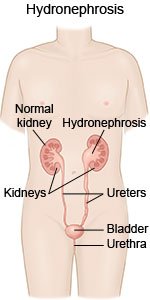Hydronephrosis in Children
Medically reviewed by Drugs.com. Last updated on May 6, 2024.
What is hydronephrosis?
Hydronephrosis is swelling in one or both of your child's kidneys caused by urine buildup. Urine normally flows from the kidneys to the bladder through tubes called ureters. A blockage in the ureters can prevent urine from flowing properly. Blocked urine flow may be caused by a narrow ureter, a kidney stone, or reflux (urine travels back up to the kidney). It may also be caused by abnormal structure of your child's kidney. Examples include a ureter that drains outside the bladder or swelling at the bottom of the ureters.
 |
What are the signs and symptoms of hydronephrosis?
Your child may not have any signs and symptoms, or he or she may have any of the following:
- Frequent urinary tract infections
- Blood in his or her urine
- Dribbling urine or loss of urine control
- Pain or tenderness in his or her abdomen, side, or lower back
- Abdominal mass
- Nausea and vomiting
How is hydronephrosis diagnosed?
- Blood and urine tests will be used to check kidney function.
- X-rays or a CT scan may be taken of your child's kidneys, bladder, and ureters. Your child may be given contrast liquid to help the blockage show up better in the pictures. Tell the healthcare provider if your child has ever had an allergic reaction to contrast liquid.
- An ultrasound uses sound waves to show pictures of your child's kidneys and bladder on a monitor. An ultrasound may show if the kidneys are swollen or enlarged. It may also show blocked urine flow or abnormal structure.
- A voiding cystourethrogram , or VCUG, is an x-ray that will show urinary reflux. The pictures will show how well your child's bladder empties and if there is any blockage.
- A kidney scan will show how well your child's kidneys are working. This test may also show the cause of any blockage and if it is severe.
How is hydronephrosis treated?
Treatment depends on the cause of your child's nephrosis. It also depends on how severe your child's hydronephrosis is. Your child's healthcare provider may decide to wait and see if it gets better on its own. Your child may need treatment for any conditions that have caused his or her nephrosis. Surgery may be needed to remove a blockage so urine can drain normally. An abnormal structure may be fixed or a shunt may be placed to help widen a narrowed part of the urethra.
When should I contact my child's healthcare provider?
- Your child has a fever.
- Your child's abdomen feels full.
- Your child has a change in how much or how often he or she urinates.
- Your child cannot control when he or she urinates and has accidents.
- Your child has low back pain or pain on one side when he or she urinates.
- You have questions or concerns about your child's condition or care.
When should I seek immediate care or call 911?
- Your child has severe, stabbing back pain.
- Your child has blood in his or her urine.
- Your child cannot urinate, or he or she urinates very little.
Care Agreement
You have the right to help plan your baby's care. Learn about your baby's health condition and how it may be treated. Discuss treatment options with your baby's healthcare providers to decide what care you want for your baby. The above information is an educational aid only. It is not intended as medical advice for individual conditions or treatments. Talk to your doctor, nurse or pharmacist before following any medical regimen to see if it is safe and effective for you.© Copyright Merative 2024 Information is for End User's use only and may not be sold, redistributed or otherwise used for commercial purposes.
Learn more about Hydronephrosis
Treatment options
Care guides
Further information
Always consult your healthcare provider to ensure the information displayed on this page applies to your personal circumstances.
